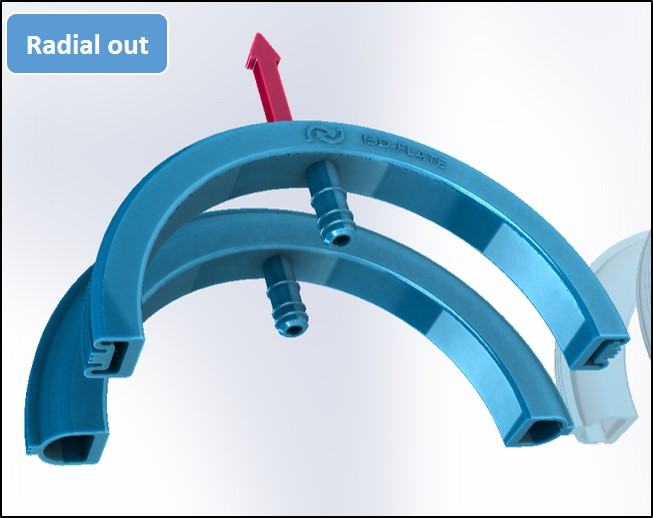Inflatable Gasket Seals: The Versatile Sealing Solution
Inflatable gasket seals have revolutionized the sealing industry with their ability to adapt to complex shapes, uneven surfaces, and varying pressures. Designed to inflate and create a tight seal under specific conditions, these gaskets are versatile and efficient, making them a preferred choice in industries like pharmaceuticals, food processing, aerospace, and more.
In this blog, we’ll explore what inflatable gasket seals are, their design, working principle, benefits, and the applications where they excel.
What Are Inflatable Gasket Seals?
Inflatable gasket seals are specialized sealing components that expand when air or fluid pressure is applied, creating a secure and tight seal between two surfaces. They are typically made from flexible materials such as silicone, EPDM, or neoprene and are designed to accommodate irregular surfaces or dynamic sealing requirements.
The ability to inflate makes these gaskets ideal for applications requiring precise sealing, especially where traditional static seals might fail.
How Do Inflatable Gasket Seals Work?
- Installation
- The gasket is installed in a specially designed groove or housing.
- Inflation
- Air or another fluid is introduced into the gasket through an inlet, causing it to expand.
- Sealing
- As the gasket inflates, it presses against the sealing surface, forming a tight and leak-proof barrier.
- Deflation
- When the pressure is released, the gasket returns to its original shape, allowing for easy disassembly or repeated use.
- Installation
Materials Used in Inflatable Gasket Seals
The material selection for inflatable gasket seals is crucial to ensure durability and compatibility with the operating environment. Common materials include:
- Silicone
- High-temperature resistance.
- Suitable for food-grade and medical applications.
- EPDM
- Excellent resistance to UV, ozone, and weathering.
- Ideal for outdoor applications.
- Neoprene
- Oil and chemical resistance.
- Commonly used in industrial settings.
- Natural Rubber
- High elasticity and abrasion resistance.
- Viton® (FKM)
- Exceptional resistance to high temperatures and chemicals.
Benefits of Inflatable Gasket Seals
- Flexibility and Adaptability
Inflatable gaskets can conform to irregular surfaces and dynamic sealing needs, making them suitable for complex or non-standard applications.
- Leak-Proof Performance
The ability to inflate ensures a consistent and reliable seal, even under varying pressures.
- Ease of Use
The inflatable design allows for easy installation, removal, and repeated use, reducing downtime.
- Durability
Manufactured from high-quality elastomers, these gaskets offer long-lasting performance in harsh environments.
- Customizability
Available in various shapes, sizes, and materials, inflatable gaskets can be tailored to specific application requirements.
Applications of Inflatable Gasket Seals
Inflatable gaskets are used across numerous industries due to their unique capabilities:
- Pharmaceutical and Medical
- Sealing in autoclaves, sterilizers, and isolation rooms.
- Ensures contamination-free environments.
- Food and Beverage
- Provides hygienic sealing for food processing equipment, including ovens and packaging machines.
- Aerospace and Defense
- Used in airlock doors, hatch seals, and testing equipment.
- Withstands extreme temperatures and pressures.
- Automotive
- Used in vehicle assembly lines and testing chambers.
- Industrial Applications
- Sealing equipment like reactors, mixing tanks, and doors in chemical plants.
- Electronics
- Protects sensitive components in cleanrooms and testing environments.
- Pharmaceutical and Medical
Design Considerations for Inflatable Gasket Seals
- Pressure Range
- Select a material and design that can handle the required inflation and operating pressures.
- Operating Environment
- Consider factors like temperature, chemical exposure, and UV resistance.
- Application Specifics
- Ensure the gasket can accommodate the required movement, whether static or dynamic.
- Groove Design
- Proper groove dimensions ensure secure installation and effective sealing.
- Inflation Medium
- Choose between air, water, or other fluids based on compatibility and application needs.
Comparison with Traditional Gaskets
Feature | Inflatable Gaskets | Traditional Gaskets |
Flexibility | Highly adaptable | Limited to fixed dimensions |
Reusable | Yes | Limited |
Sealing Surface | Accommodates irregularities | Requires flat, smooth surfaces |
Applications | Dynamic and complex | Static or simple |
Why Choose Inflatable Gasket Seals from Rubber Seals and Gaskets?
At Rubber Seals and Gaskets, we offer high-quality inflatable gasket seals designed to meet the demands of modern industries. Here’s why you should choose us:
- Premium Materials: We use only the best materials to ensure durability and reliability.
- Custom Solutions: Tailored designs to suit your specific applications.
- Expert Support: Our team of experts is always ready to assist with technical queries.
- Industry Standards: Our products comply with global quality standards for safety and performance.
Maintenance Tips for Inflatable Gasket Seals
- Regular Inspection
- Check for signs of wear, tear, or damage.
- Proper Cleaning
- Use appropriate cleaning agents to maintain hygiene and material integrity.
- Storage
- Store in a cool, dry place away from direct sunlight and chemicals.
- Monitor Inflation Pressure
- Avoid over-inflation to prevent damage or reduced lifespan.
Conclusion
Inflatable gasket seals are a versatile and efficient solution for a wide range of industrial sealing applications. Their adaptability, durability, and ease of use make them an invaluable asset in industries where precision and reliability are critical.
At Rubber Seals and Gaskets, we specialize in delivering top-tier inflatable gasket seals for diverse needs. Whether you’re in pharmaceuticals, food processing, or aerospace, our solutions are designed to exceed your expectations.
Contact us today to learn more about our inflatable gasket seals and how they can enhance your operations.

FAQs
In some cases, they can be reused after proper inspection, but it’s generally recommended to replace them for critical applications.
Yes, depending on the material, RJGs can resist corrosive media. Materials like Inconel and Hastelloy are ideal for such conditions.
RJGs are available in various standard sizes as per ASME B16.20, but custom sizes can also be manufactured.
The choice depends on the flange groove design. Consult the flange specifications or a sealing expert.
Ensure your industrial systems operate at peak performance with the right gasket solutions. Trust only the best with Rubber Seals and Gaskets!
